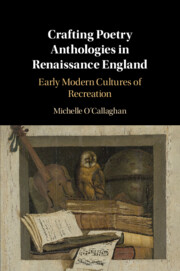Book contents
- Crafting Poetry Anthologies in Renaissance England
- Crafting Poetry Anthologies in Renaissance England
- Copyright page
- Contents
- Illustrations
- Acknowledgements
- Note on the text
- Introduction
- Chapter 1 Books in Process
- Chapter 2 Household Books
- Chapter 3 ‘To the Gentleman Reader’
- Chapter 4 ‘Impos’d designe’
- Chapter 5 A Poetical Rapsody
- Conclusion
- Bibliography
- Index
Conclusion
Published online by Cambridge University Press: 23 December 2020
- Crafting Poetry Anthologies in Renaissance England
- Crafting Poetry Anthologies in Renaissance England
- Copyright page
- Contents
- Illustrations
- Acknowledgements
- Note on the text
- Introduction
- Chapter 1 Books in Process
- Chapter 2 Household Books
- Chapter 3 ‘To the Gentleman Reader’
- Chapter 4 ‘Impos’d designe’
- Chapter 5 A Poetical Rapsody
- Conclusion
- Bibliography
- Index
Summary
This book argues that using craft as a tool of analysis in the study of poetry anthologies means that it is possible to conceptualise processes of production, from compilation to poetic making and remaking, as embodied practices. The craft of anthology-making involved people, objects, and environments, from printing houses and bookshops to households in all their social diversity, and allows this study to attend to the microsocialities created through shared practices, textual material, and performances. Craft offers an incorporative model of literary history that brings together authors, compilers, publishers, printers, readers, and performers from across the social spectrum and tells stories of cultural formation that are alert to its hybridity. The form of the poetry anthology is itself incorporative, gathering a variety of poems that often have travelled and will travel widely, moving between the elite and non-elite, placing gentleman and gentlewomen alongside citizens, servants, and anonymous others, and capturing within their pages the heterogeneity of vernacular literary cultures. Attending to the crafting of anthologies therefore allows us to account for the variety of early modern recreational cultures and modes of poetic making that travel across the social spectrum and are constitutive of a domestic Renaissance that is always thoroughly heteroglot.
- Type
- Chapter
- Information
- Crafting Poetry Anthologies in Renaissance EnglandEarly Modern Cultures of Recreation, pp. 228 - 230Publisher: Cambridge University PressPrint publication year: 2020

